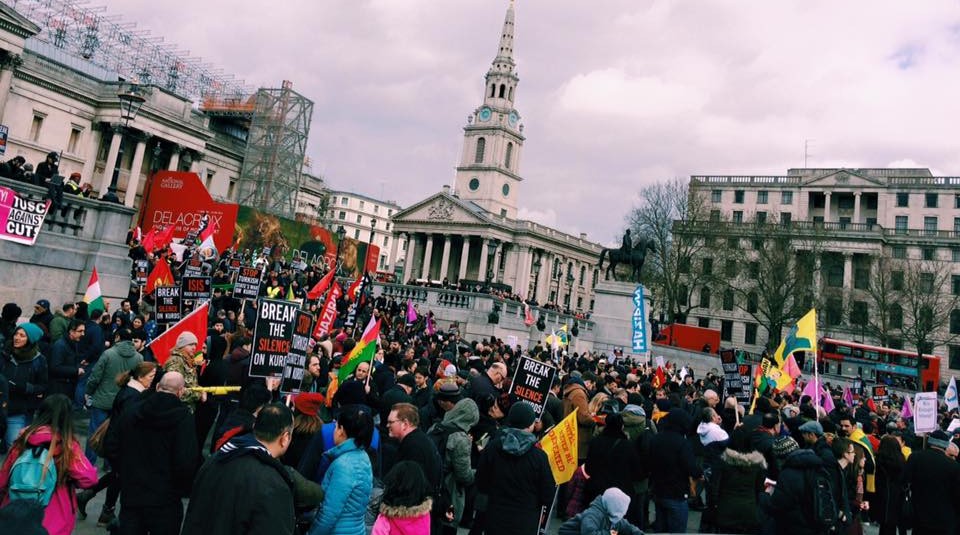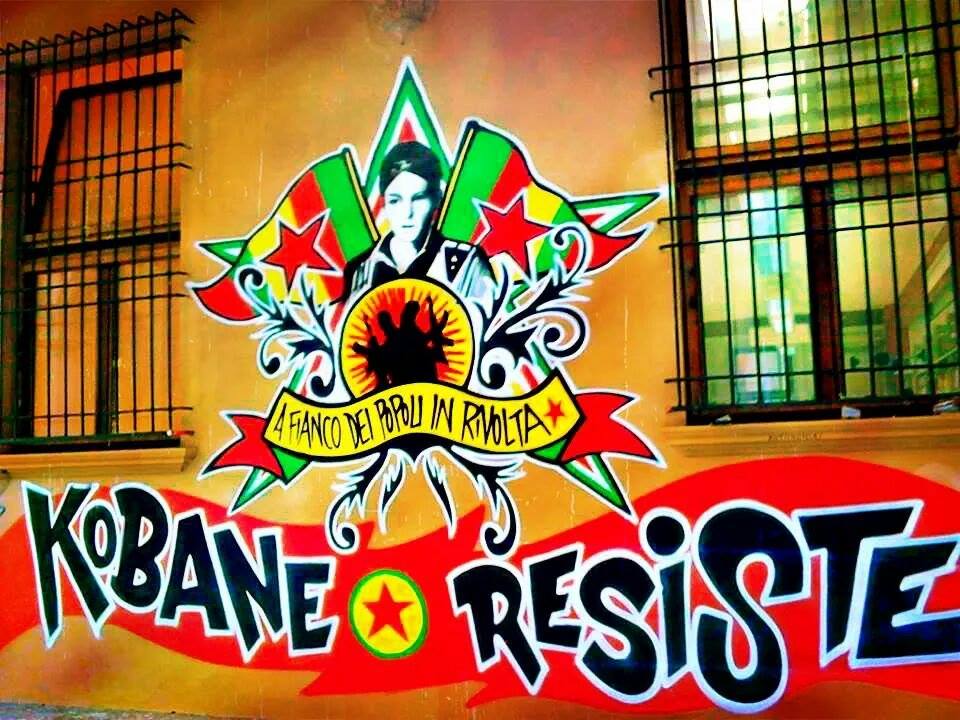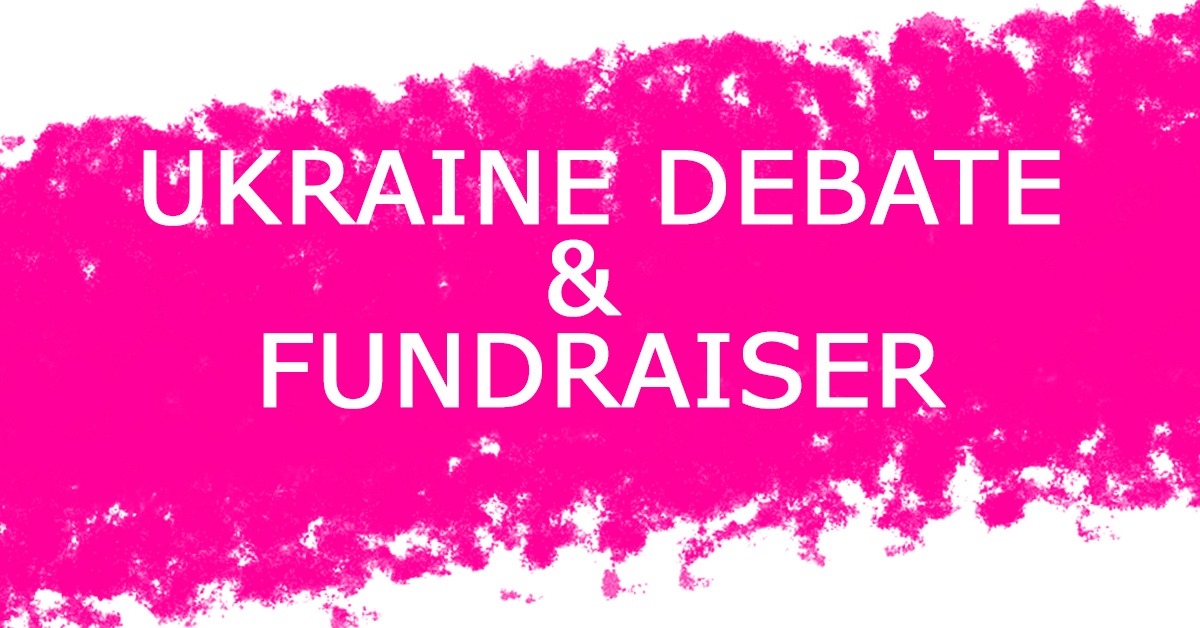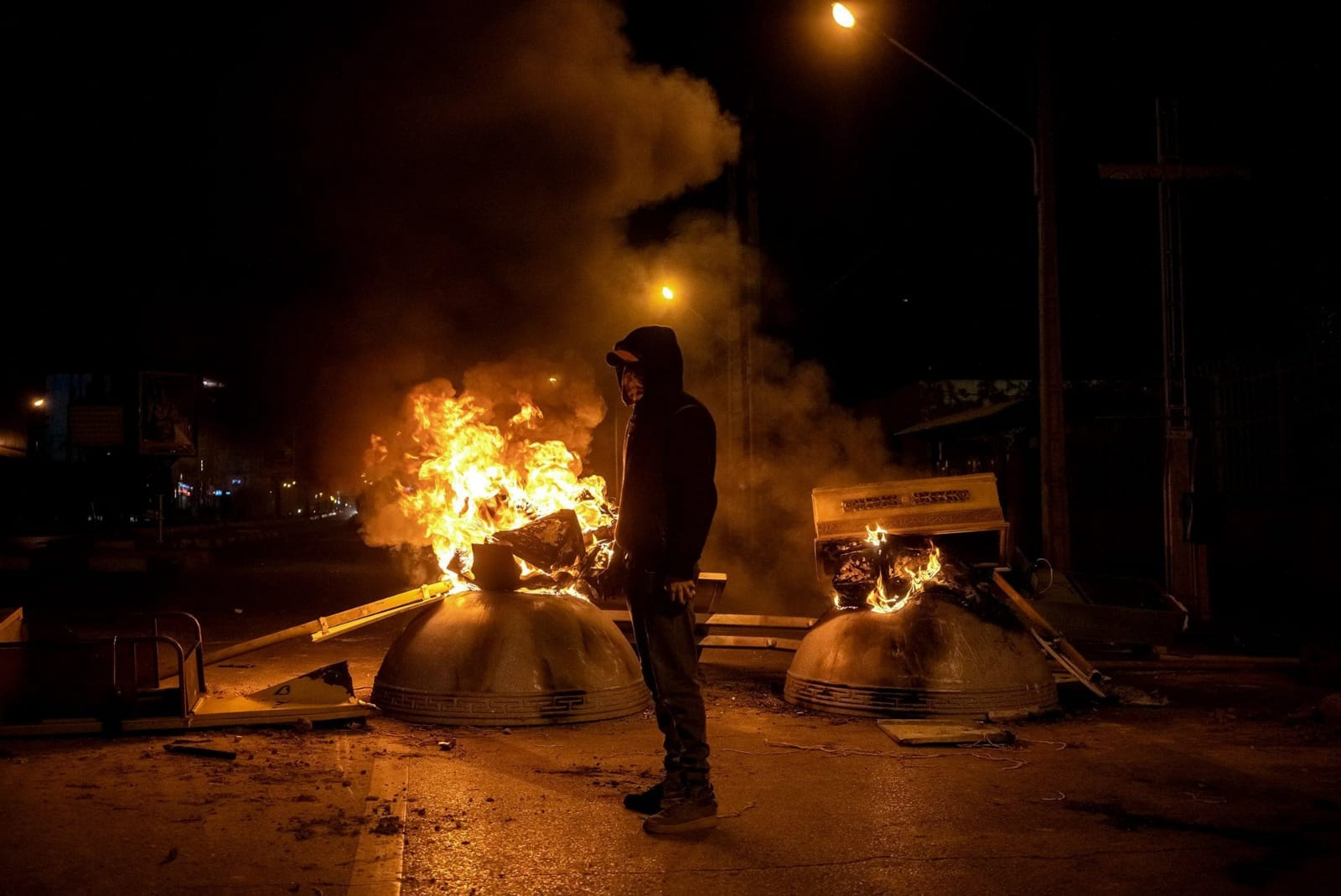This article was written by two friends of Plan C who recently returned from Rojava. The Rojava Solidarity Cluster is interested the issue of support in Rojava and hope this text contributes to that understanding in the broader left. It is also worth noting that there is currently a member of the cluster in Rojava who will be providing further updates and contributions, you can find out more about that here: http://planc.autonomic.zone/blog/spread-revolution-rojava/
Thinking critically about solidarity with the struggles there
We are writing this article as two anarchists from the UK who went to live and work in Rojava for a few months, primarily due to our political interest in the region and the changes there, but also as healthcare workers with the aim of supporting and engaging in the revolution through doing medical work.
We have frequently been asked by our European comrades how they can best show solidarity with Rojava, so we wanted to write a brief piece covering some of the thoughts we have had about this subject on the basis of our experiences there. We have also asked the opinions of other people in Rojava (both Kurdish and international comrades) and incorporated their thoughts too.
We are doing this in the spirit of critical solidarity with the revolutionary changes that have happened in Rojava. Zaher Baher1 has written more knowledgeably than we can ever hope to about considering the pitfalls of uncritically cheerleading the movement/s there and thinking about what parts of them should be supported and what parts we should be more cautious about. We recommend his article and also another by Dilar Dirik for a slightly different perspective on solidarity.2
This writing is not intended to assess and critique the situation in Rojava, though of course we think ongoing discussions of this nature are important, but more to offer some opinions and questions to be considered by those who want to offer support to the movements and changes there.
Solidarity… but with whom and what?
People are understandably quick to offer and declare ‘solidarity with Rojava’. And while we appreciate that most people know there is much more complexity than this simple slogan might suggest, it often seems that this is sometimes forgotten in the rush to provide support.
The changes there (and changes to come) are very far from a unified revolutionary or radical project – and the breadth, depth, and radical nature of them are of course something very worthy of discussion itself – and we hope to write something about that soon.3 So when offering and providing support ‘to Rojava’ it needs to be considered what part of the movement/s one is actually providing support to, and what political dynamic this is strengthening and/or weakening on the ground.
We do not pretend to have anything like a full understanding of the political dynamics in Rojava. But be aware that whatever you do or whatever support you give, nothing you are doing or supporting there is politically neutral, and it might well be supportive of some parts of the revolution, but without careful consideration it could easily be supporting liberal, capitalist, reactionary, oppressive, or even counter-revolutionary tendencies there.
Apart from the self-organised structures like Tev-Dem and Kongreya Star that promote bottom up democratic decision making and the involvement of everyone in political thinking and organising, other political players in the region include the PKK, the Assad regime, various political parties in Rojava, including of course the largest, the PYD, as well as some international, national, and local NGOs. The political systems and parties in the Kurdish Regional Government (KRG) of Iraq also have an influence. You then have a number of militias with a variety of politics and connections, and military organisations like the YPG/YPJ, and the SDF who have various links and allegiances – including with western military forces and intelligence agencies that some are working with on the ground. As well as these military and political organisations and groups, financial and business interests are also at play there, as well as a complex mix of religious groups and tendencies.
And of course all of these groups are themselves full of individuals that often have their own agendas, needs, religion, cultural/political beliefs, and personal issues.
It is also important not to see Rojava in isolation from what is happening in the surrounding areas. What happens there shouldn’t be separated from what is happening in the rest of Syria and it is important to understand that there may be conflicts now, or in the future, between the struggles in Rojava and the wider revolution in Syria, especially with the expansion of the Rojava cantons by the SDF with western military involvement and support.4
Many people in the west seem to think that the revolution in Rojava has happened, but it hasn’t in any way been concluded, many people that live there are either unsupportive, unsure, or uninvolved in it, and the struggle is very much ongoing, with everything still to win or lose.
Raised some funds for Rojava?
In our first weeks there we met a number of people in Rojava who wanted to know why a certain group or person had visited the area, made commitments and promises to help, and had then left never to be heard from again. Understandably some people we have met there are highly sceptical when other westerners make promises or suggestions about starting new projects. One of us personally witnessed a European activist visiting numerous projects during their week-long visit, promising each of them help and resources that we knew they could almost certainly never deliver. Not only does this make it hard for other people from overseas to be taken seriously, it much more importantly means people there waste time and resources working on projects that are never going to happen when the promised support never appears.
We would very strongly suggest not making any promises (or even suggesting the possibility) of sending money or resources to Rojava, setting up new projects, or say you’re going to the area (or coming back to if you’re there already) unless you are 100% sure that you are going to be able to do what you say you will.
We have also seen and heard of lots of projects which, although started with the best intentions, are either not that useful or not that sustainable. For example, ambulances which can’t be driven on rough roads or with parts that can’t be replaced, and collections of books in languages that aren’t understood in the region. There are even whole projects that mimic western models but that in the cultural and practical context aren’t appropriate, or would need years of systematic educational work and massive structural changes to make them actually work in practice – assuming that they were even desirable in the first place. On the subject of providing training, something that often gets done as it can require less material and seems to tick the box of having a ‘long term’ perspective, be wary that sometimes what people say they want is not actually what they need, and the reasons for requesting something might be more complex than it might appear at first.
How can you find out what is really needed and supports the revolutionary aspects of what’s happening in Rojava? Asking a Kurdish person (Kurdish people obviously aren’t one unified group with the same politics) or a European who has been there isn’t enough. In our experience people often say yes or will agree to things which turn out not to be that useful, and that’s before even considering the revolutionary element (or not) of the support. This can be for a number of reasons such as not understanding what is being asked, issues with translation and language differences, wanting to sustain supportive relationships, issues to do with money, power dynamics between different groups of people in Rojava, and of course between people in Rojava and westerners.
Furthermore, you need to be sure that you have the means to get any money or goods that you are raising money for to the region, and bear in mind that your plan to transport resources might well not be possible by the time you have gathered them all together – or the materials could be impounded or stolen at the first border crossing. We have heard of ambulances and medical supplies that have been bought for Rojava and are stuck in Europe, with the medicines soon to go out of date. It is also even complicated and difficult to get money to Rojava as there are no banks or financial institutions that can transfer it and it has to be done informally.
Also what part of the system there do you want to support? Is it the self-organised structures, a political party, one of the few NGOs there, or one of the many organisations that probably fall somewhere in between these? We have heard various opinions about the role of NGOs and thought a lot about it ourselves since being here. At times of crisis having NGOs able to pick up some of the emergency and infrastructural work is possibly necessary and useful. But we know that some NGOs can be the ‘soft’ arm of the state and can have a negative affect on more autonomous forms of organising. This needs some thought – there isn’t an easy answer, but it is worth considering that things aren’t as simple as they may seem, even when providing what might seem like ‘neutral’ medical aid or supplies to refugees or internally displaced persons.
Issues to consider with NGOs there are whether they will work with the structures in Rojava or want to impose their own, and whether their employment of local people could have a negative affect – such as highly skilled people taking on lower skill jobs due to the relatively high wages that they pay. Think about whether the people or projects you are supporting are really able to provide sustainable, meaningful support in the region, in a way that you think is ethical and politically sound.
So, what is worth supporting financially there? When picking a project to support, find one that has a proper plan, the involvement (or at the very least the approval) of the self-organised collective structures, and a long-term outlook or immediate goals that are clear and achievable, and of course doing something that fills an actual need people there have, not one that outsiders think exists.
People in Rojava, particularly in the women’s movements, tell us that they really appreciate Europeans wanting to understand what is happening here, get to know their work and to learn from and support it. They want to know about the differences between woman’s situations and movements in Rojava and in other parts of the world, and they want to work to make mutually beneficial links with social movements in other places.
While we have been critical of some of the attempts at solidarity, in terms of projects and support from outside Rojava we saw some amazing things there, with lives that might otherwise have been lost saved, and support for some genuinely revolutionary projects that are both making a real daily difference to people, but also laying the groundwork for a more liberated society for generations to come.
If you’re working on solidarity projects or seriously thinking about going to Rojava we’re happy to discuss anything relevant to these areas. We’d also welcome comments and criticisms of what we have written here and hope it will inspire discussion.
Contact: jay_and_anna@yahoo.com (PGP key available)
1) See https://libcom.org/library/our-attitude-towards-rojava-must-be-critical-solidarity
2) See https://roarmag.org/essays/privilege-revolution-rojava-solidarity/
3) But for now, here’s one bit of a six part essay addressing that topic here https://www.opendemocracy.net/5050/rahila-gupta/rojava-revolution-how-deep-is-change
4) On this topic have a look at: https://thehamiltoninstitute.noblogs.org/post/2016/05/13/the-most-important-thing-two-speaking-tours-and-the-syrian-revolution/ and the resources mentioned on it at the end of the article, as well as this book “Burning Country: Syrians in revolution and War” by Robin Yassin-Kassab and Leila Al-Shami https://www.amazon.co.uk/dp/B01A5OJTDO/ref=dp-kindle-redirect?_encoding=UTF8&btkr=1
This interview http://www.spl.org/Audio/16_04_28_Yassin-Kassab_and_Al-Shami.mp3 with the authors of “Burning Country” is also excellent, and in it Leila raises concerns about the PYD, doubting its commitment to democratic federalism and the wider Syrian revolution due to Kurdish nationalism.








